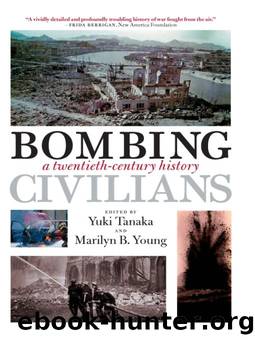Bombing Civilians by Yuki Tanaka & Marilyn B. Young

Author:Yuki Tanaka & Marilyn B. Young [Tanaka, Yuki & Young, Marilyn B.]
Language: eng
Format: epub
Publisher: The New Press
Published: 2010-08-03T11:00:00+00:00
Although Chongqingâs buildings and streets were reduced to heaps of debris, the military and civilians worked together to bore into the sandstone beneath the city to build an enormous and sturdy underground tunnel where they could take shelter. The people continued their resistance and maintained their will to fight in spite of the massive civilian casualties inflicted by the bombings.
Japanese military commanders thought that a âterror from the skyâ bombing campaign would break the will of the enemy and lead them to surrender. This type of thinking proved false in the case of the Chongqing bombings, and also in other aerial bombings. We can see the futility of attempting to bomb people into submission by studying the reactions of those whose cities were bombed in World War II and later wars. During the Korean War, people in North Korea were hit with more napalm and incendiary bombs than were dropped on Japan in the Pacific War, but they still did not give up. Also during the Vietnam War, the people fought back after the massive ânorth bombings,â which again proved that the bombing of cities does not crush the will of the people.
Eventually the âboomerangâ of strategic bombing hit back at Japan with redoubled ferocity in the bombings of Japanese cities. The initial air raid was in June 1944 when the northern part of the island of Kyushu was hit by B-29 bombers, which took off from a U.S. air base near Chengdu, in the same province (Sichuan) as Chongqing, under the direction of the U.S. Air Force headquarters in Chongqing. This was one of the most hard-hitting illustrations of cause and effect in the history of war.
What can we learn from the Chongqing bombings? Letâs turn once more to In Search of History, by Theodore White:More people were killed [in the first nightâs bombing] than ever before by bombardiers. But what was most important about the killings was their purpose of terror. Nanking and Shanghai had already been bombed; those, however, were military bombings. There was no military target within the old walls of Chungking. Yet the Japanese had chosen, deliberately, to burn it to the ground, and all the people within it, to break some spirit they could not understand, to break the resistance of the government that had taken refuge somewhere in Chungkingâs suburbs. I never thereafter felt any guilt when we came to bomb the Japanese; when we bombed, we bombed purposefully, to erase Japanâs industry and war-making power; no American planes swooped low to machine-gun people in the streets, as had the Japanese.19
Download
This site does not store any files on its server. We only index and link to content provided by other sites. Please contact the content providers to delete copyright contents if any and email us, we'll remove relevant links or contents immediately.
| Biological & Chemical | Conventional |
| Nuclear |
The Radium Girls by Kate Moore(12028)
100 Deadly Skills by Clint Emerson(4926)
Rise and Kill First by Ronen Bergman(4789)
The Templars by Dan Jones(4689)
The Doomsday Machine by Daniel Ellsberg(4490)
The Rape of Nanking by Iris Chang(4213)
Killing England by Bill O'Reilly(4004)
Stalin by Stephen Kotkin(3968)
Hitler in Los Angeles by Steven J. Ross(3946)
12 Strong by Doug Stanton(3550)
Hitler's Monsters by Eric Kurlander(3343)
Blood and Sand by Alex Von Tunzelmann(3205)
The Code Book by Simon Singh(3189)
Darkest Hour by Anthony McCarten(3133)
The Art of War Visualized by Jessica Hagy(3008)
Hitler's Flying Saucers: A Guide to German Flying Discs of the Second World War by Stevens Henry(2754)
Babylon's Ark by Lawrence Anthony(2679)
The Second World Wars by Victor Davis Hanson(2526)
Tobruk by Peter Fitzsimons(2518)
